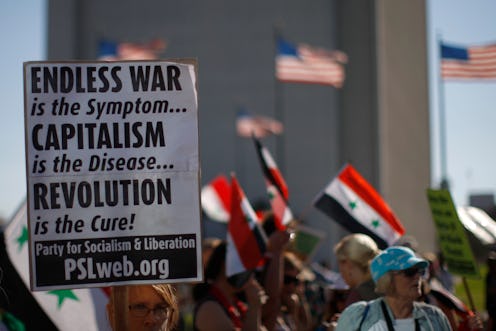News
Syrian Opposition Not Satisfied with Deal
Only a day after the Free Syrian Army rejected the U.S.-Russia agreement to avoid punitive action in Syria, a different opposition group — the Syrian National Coalition — has called for an addition to the deal: banning the use of ballistic missiles by President Assad's forces.
The group (the main Western-backed Syrian opposition coalition) is insisting that forcing President Bashar al-Assad to give up chemical weapons just isn't enough — especially when government forces use their air power to target civilians.
The coalition said in a statement:
"The Syrian National Coalition insists that the ban of use of chemical weapons, which led to the loss of lives of more than 1,400 Syrian civilians, must be extended to ban the use of the regime air power and ballistic weapons against population centers, in addition to the redeployment of heavy weapons away from population centers, and the prohibition of use of these weapons to bomb Syrian cities and villages...
The world must not allow the Assad regime to take advantage of the Russian initiative and their joining the treaty on the prohibition of the use of chemical weapons as an excuse to continue the daily slaughter of the Syrian people with impunity."
The statement comes a day after the United States and Russia made a deal under which Syria has one week to catalog its chemical stockpile and until the middle of 2014 to destroy them all, in exchange for avoiding (at least temporarily) U.S. military strikes on the Assad regime.
"I say to the Syrian opposition and all those in Syria who recognize that just removing the chemical weapons doesn't do the job: We understand that," Kerry said Sunday. "That is not all we are going to seek to do. But it is one step forward."
The framework — which doesn't for the moment include prohibitions on non-chemical weapons — now goes to the Security Council. There, talks will continue between Secretary of State John Kerry, French Foreign Minister Laurent Fabius, and British Foreign Secretary William Hague, who will try to figure out a resolution that will deal with the repercussions should Syria fail to comply.
"Laurent Fabius will go to Russia to meet with his Russian counterpart to end this process, and we could vote on this resolution before the end of the week," French President Francois Hollande said. "This does not mean that we would be done with the case. The violence is still ongoing, the war in Syria is still ongoing, so the next step will be to find a political solution."
Meanwhile, the United Nations inspectors' report on the August 21 chemical attack is due to be released Monday. Already, the UN Secretary-General Ban Ki-moon has received the report, and will be briefing the Security Council on it early this morning. While the document is unlikely to point fingers explicitly at the Syrian regime, reports are suggesting that it will confirm that only government forces would have had the capability to carry out such a large-scale attack.
